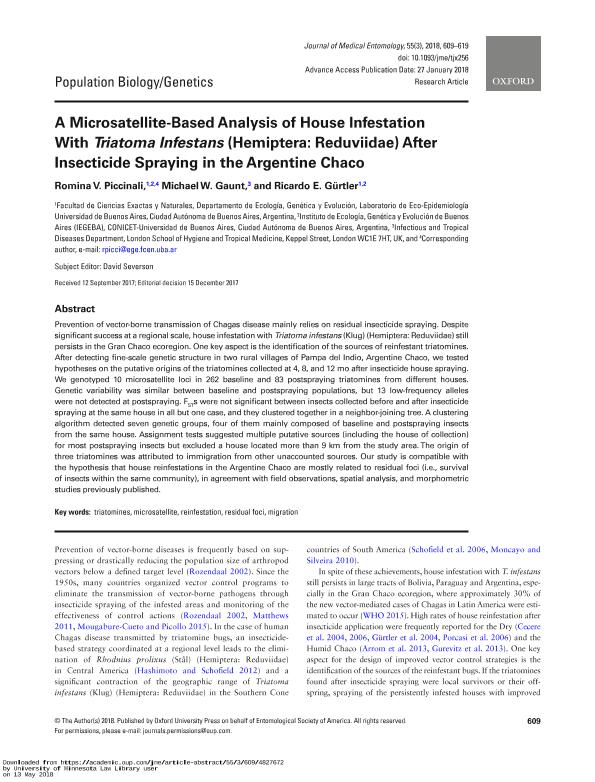Mostrar el registro sencillo del ítem
dc.contributor.author
Piccinali, Romina Valeria

dc.contributor.author
Gaunt, Michael W
dc.contributor.author
Gurtler, Ricardo Esteban

dc.date.available
2020-02-03T20:16:18Z
dc.date.issued
2018-05
dc.identifier.citation
Piccinali, Romina Valeria; Gaunt, Michael W; Gurtler, Ricardo Esteban; A Microsatellite-Based Analysis of House Infestation With Triatoma Infestans (Hemiptera: Reduviidae) After Insecticide Spraying in the Argentine Chaco; Oxford University Press; Journal of Medical Entomology; 55; 3; 5-2018; 609-619
dc.identifier.issn
0022-2585
dc.identifier.uri
http://hdl.handle.net/11336/96585
dc.description.abstract
Prevention of vector-borne transmission of Chagas disease mainly relies on residual insecticide spraying. Despite significant success at a regional scale, house infestation with Triatoma infestans (Klug) (Hemiptera: Reduviidae) still persists in the Gran Chaco ecoregion. One key aspect is the identification of the sources of reinfestant triatomines. After detecting fine-scale genetic structure in two rural villages of Pampa del Indio, Argentine Chaco, we tested hypotheses on the putative origins of the triatomines collected at 4, 8, and 12 mo after insecticide house spraying. We genotyped 10 microsatellite loci in 262 baseline and 83 postspraying triatomines from different houses. Genetic variability was similar between baseline and postspraying populations, but 13 low-frequency alleles were not detected at postspraying. FSTs were not significant between insects collected before and after insecticide spraying at the same house in all but one case, and they clustered together in a neighbor-joining tree. A clustering algorithm detected seven genetic groups, four of them mainly composed of baseline and postspraying insects from the same house. Assignment tests suggested multiple putative sources (including the house of collection) for most postspraying insects but excluded a house located more than 9 km from the study area. The origin of three triatomines was attributed to immigration from other unaccounted sources. Our study is compatible with the hypothesis that house reinfestations in the Argentine Chaco are mostly related to residual foci (i.e., survival of insects within the same community), in agreement with field observations, spatial analysis, and morphometric studies previously published.
dc.format
application/pdf
dc.language.iso
eng
dc.publisher
Oxford University Press

dc.rights
info:eu-repo/semantics/openAccess
dc.rights.uri
https://creativecommons.org/licenses/by-nc-sa/2.5/ar/
dc.subject
triatomines
dc.subject
microsatellite
dc.subject
reinfestation
dc.subject
residual foci
dc.subject
migration
dc.subject.classification
Genética y Herencia

dc.subject.classification
Ciencias Biológicas

dc.subject.classification
CIENCIAS NATURALES Y EXACTAS

dc.title
A Microsatellite-Based Analysis of House Infestation With Triatoma Infestans (Hemiptera: Reduviidae) After Insecticide Spraying in the Argentine Chaco
dc.type
info:eu-repo/semantics/article
dc.type
info:ar-repo/semantics/artículo
dc.type
info:eu-repo/semantics/publishedVersion
dc.date.updated
2019-10-09T20:43:09Z
dc.identifier.eissn
1938-2928
dc.journal.volume
55
dc.journal.number
3
dc.journal.pagination
609-619
dc.journal.pais
Reino Unido

dc.journal.ciudad
Oxford
dc.description.fil
Fil: Piccinali, Romina Valeria. Consejo Nacional de Investigaciones Científicas y Técnicas. Oficina de Coordinación Administrativa Ciudad Universitaria. Instituto de Ecología, Genética y Evolución de Buenos Aires. Universidad de Buenos Aires. Facultad de Ciencias Exactas y Naturales. Instituto de Ecología, Genética y Evolución de Buenos Aires; Argentina
dc.description.fil
Fil: Gaunt, Michael W. London School Of Hygiene And Tropical Medicine; Reino Unido
dc.description.fil
Fil: Gurtler, Ricardo Esteban. Consejo Nacional de Investigaciones Científicas y Técnicas. Oficina de Coordinación Administrativa Ciudad Universitaria. Instituto de Ecología, Genética y Evolución de Buenos Aires. Universidad de Buenos Aires. Facultad de Ciencias Exactas y Naturales. Instituto de Ecología, Genética y Evolución de Buenos Aires; Argentina
dc.journal.title
Journal of Medical Entomology

dc.relation.alternativeid
info:eu-repo/semantics/altIdentifier/url/https://academic.oup.com/jme/advance-article/doi/10.1093/jme/tjx256/4827672
dc.relation.alternativeid
info:eu-repo/semantics/altIdentifier/doi/http://dx.doi.org/10.1093/jme/tjx256
Archivos asociados
